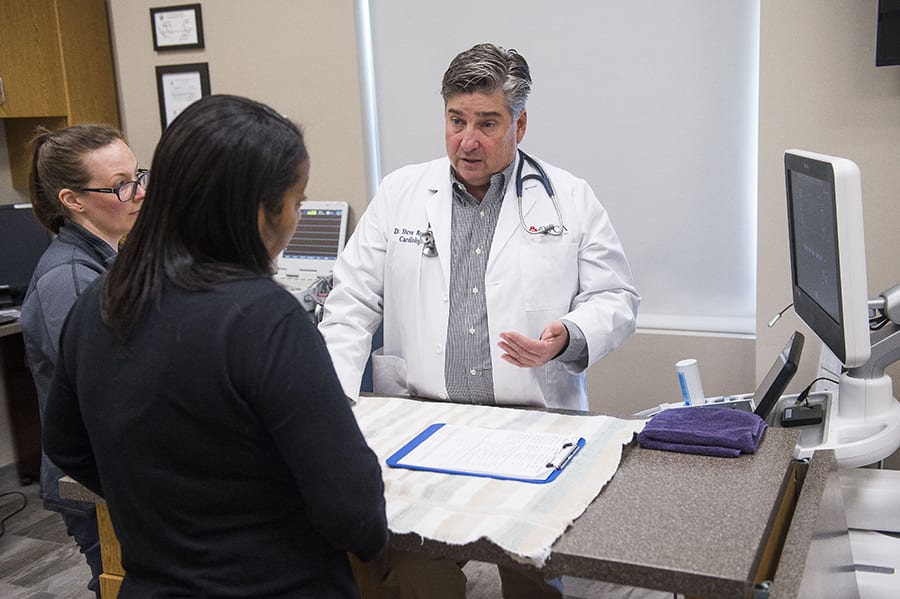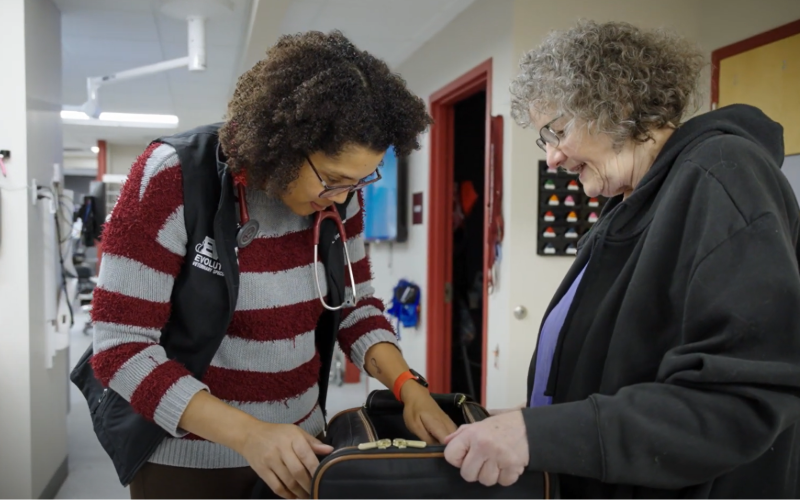Common Symptoms That Your Pet Might Need a Cancer Veterinary Near Me}
Wiki Article
Discovering the Necessary Solutions Provided by a Vet Cardiologist: Comprehending Ultrasound and CT Scan Techniques
Veterinary cardiologists play an essential function in the health and wellness of pets by detecting and treating various heart problems. They use advanced imaging methods, such as heart ultrasound and CT scans, to supply precise evaluations. Each method has its distinctive advantages and applications. Comprehending these techniques is crucial for family pet owners looking for the most effective take care of their buddies. What factors should family pet owners think about when choosing in between these diagnostic devices?
The Duty of Vet Cardiologists in Pet Dog Healthcare
Vet cardiologists play a vital role in the health care of family pets, concentrating especially on detecting and treating heart-related conditions. They possess specialized training that enables them to translate complicated diagnostic tests and identify different cardiovascular problems. These specialists make use of sophisticated methods, such as echocardiography and electrocardiography, to evaluate heart function and structure accurately.Veterinary cardiologists likewise develop tailored therapy plans that may include medications, lifestyle modifications, and, in some situations, medical treatments. Their know-how reaches enlightening family pet owners regarding heart health and wellness, highlighting the value of normal examinations and early discovery of possible issues. Partnership with basic vets is crucial, as it ensures comprehensive care for pets with suspected heart concerns. By offering specialized services, vet cardiologists considerably enhance the lifestyle for pet dogs and give tranquility of mind for their proprietors, reinforcing the value of heart wellness in general pet health.Typical Cardiac Problems in Pet Dogs
Typical cardiac concerns in animals can substantially affect their wellness and high quality of life. Heart whisperings, various sorts of cardiomyopathy, and genetic heart problems are among one of the most prevalent problems that veterinarians run into. Cancer Veterinary Near Me. Recognizing these issues is crucial for animal proprietors to guarantee prompt medical diagnosis and ideal treatmentHeart Murmurs in Pets
Heart murmurs can be a resource of worry for pet proprietors, they are not always a sign of significant health problems. A heart whispering is an irregular sound generated by turbulent blood flow within the heart. In pet dogs, these whisperings can be created by various elements, including hereditary heart problems, valve problems, or perhaps stress during evaluations. Numerous pet dogs with heart murmurs lead typical lives without substantial health impacts. To identify the underlying reason, vet cardiologists frequently utilize analysis methods such as echocardiograms and Doppler ultrasounds. Early discovery and analysis are important, as they might help manage any type of prospective cardiac issues efficiently. Pet owners are encouraged to consult their vet for a complete examination if a heart murmur is spotted.Cardiomyopathy Types Explained
Cardiomyopathy encompasses a team of conditions influencing the heart muscle, resulting in endangered cardiac function in animals. One of the most usual kinds include expanded cardiomyopathy (DCM), hypertrophic cardiomyopathy (HCM), and limiting cardiomyopathy (RCM) DCM largely impacts canines, causing the heart to damage and enlarge, which reduces its capability to pump blood efficiently. In contrast, HCM is more widespread in pet cats, identified by the enlarging of the heart walls, often causing blocked blood flow. RCM, though much less usual, takes place when the heart muscular tissue comes to be inflexible, restricting its ability to load with blood. Each kind presents one-of-a-kind obstacles in diagnosis and treatment, necessitating specialized vet cardiological analysis to assure peak administration and care for influenced pet dogs.Genetic Heart Flaws
Hereditary heart problems represent a substantial classification of cardiac problems in pets, unique from obtained conditions such as cardiomyopathy - Board Certified Veterinary Cardiologist. These defects are architectural problems present at birth, affecting the heart's regular function. Usual types include license ductus arteriosus, ventricular septal flaws, and pulmonic stenosis. Signs and symptoms might differ widely, varying from light to severe, and can consist of workout intolerance, coughing, and difficulty breathing. Early medical diagnosis through sophisticated imaging techniques like ultrasound is necessary for effective monitoring. Veterinary cardiologists play a crucial duty in determining these problems and suggesting proper therapy alternatives, which may consist of clinical management or surgical treatment. Recognizing hereditary heart defects allows for much better results and improved lifestyle for influenced petsRecognizing Cardiac Ultrasound: Just How It Works
A considerable number of vet practices currently make use of heart ultrasound as a vital analysis tool for reviewing heart health and wellness in pets. This non-invasive method uses high-frequency audio waves to produce photos of the heart's framework and feature. Throughout the treatment, a veterinary specialist applies a gel to the pet's upper body and makes use of a transducer to produce ultrasound waves. These waves jump off the heart and surrounding structures, generating real-time images on a monitor.Veterinarians can assess different aspects of cardiac health, consisting of chamber dimension, wall activity, and valve function. Furthermore, cardiac ultrasound enables the detection of abnormalities such as liquid buildup and hereditary heart flaws. This method is important for identifying problems that may not be visible via standard radiographs. By offering in-depth info regarding the heart's makeup and efficiency, heart ultrasound help in creating reliable therapy plans for animals experiencing heart problem.The Significance of CT Scans in Diagnosing Heart Issues
Just how do CT scans improve the diagnosis of heart disease in vet medication? CT scans give in-depth cross-sectional pictures of the heart and bordering frameworks, enabling veterinarians to envision complicated physiological connections. This imaging technique is particularly valuable in identifying congenital heart defects, heart growths, and abnormalities in blood vessels. By utilizing advanced imaging formulas, CT scans can analyze heart chamber dimensions and feature, using an extensive view that might be difficult to achieve with standard methods.Additionally, CT angiography can imagine blood circulation and determine areas of stenosis or blockage, which is necessary for planning prospective interventions. The speed and precision of CT scans additionally assist in quick diagnoses, vital in emergency situation situations. Eventually, the unification of CT scans into vet cardiology considerably enhances the precision of medical diagnoses, allowing targeted treatment plans and enhancing person end results for animals experiencing heart problems.Comparing Ultrasound and CT Check Techniques
While both ultrasound and CT scans are vital devices in vet cardiology, they offer distinctive advantages and restrictions that influence their usage in detecting heart disease. Ultrasound, or echocardiography, gives real-time imaging of the heart's structure and function, allowing veterinarians to evaluate heart chambers, shutoffs, and blood circulation. It is specifically effective for evaluating conditions like coronary infarction and cardiomyopathy. Nevertheless, ultrasound may be limited in imagining certain anatomical structures because of client dimension or obesity.In comparison, CT checks deal comprehensive cross-sectional photos of the heart and surrounding cells, making them ideal for determining structural irregularities, growths, or vascular problems. Although CT scans offer extensive insights, they need sedation and might entail radiation exposure. Inevitably, the option between ultrasound and CT checks depends upon the specific click this link professional situation, the patient's problem, and the information required for an exact medical diagnosis.Treatment Options Offered Through Veterinary Cardiology
Vet cardiology offers a series of treatment options customized to address numerous heart conditions in pets. Treatment strategies often start with way of life adjustments, including diet plan changes and workout modifications, intended at improving general heart health and wellness. Medications play a vital role, with cardiologists prescribing drugs such as diuretics, look at this web-site beta-blockers, and ACE inhibitors to manage signs and symptoms and improve cardiac function.In a lot more severe instances, interventional treatments, such as balloon valvuloplasty or stent placement, might be necessary to alleviate clogs or boost blood circulation. For particular hereditary heart issues, surgical choices might be discovered to fix structural problems. In addition, recurring monitoring and follow-up treatment are crucial components of an extensive therapy strategy, enabling timely changes based upon the animal's action to treatment. Overall, veterinary cardiology concentrates on supplying reliable, personalized like enhance the health and well-being of animal people with heart disease.How to Prepare Your Animal for a Cardiac Analysis
Preparing a pet for a heart analysis is vital to ensure precise results and a smooth process. Owners must initially arrange the appointment with the veterinary cardiologist and discuss any kind of specific demands or worries. It is suggested to keep food for a minimum of 12 hours prior to the analysis, as this assists improve imaging high quality throughout treatments like ultrasound or CT scans.Additionally, keeping a tranquil atmosphere on the day of the consultation can assist reduce the pet dog's stress and anxiety. It is beneficial to bring along any pertinent clinical documents, including previous examinations and drugs (CT Scans For Dogs). Proprietors ought to additionally make sure that their pet dog is comfortable and leashed during transportation to the facility. Finally, familiarizing themselves with the analysis procedure can assist and minimize concerns in asking notified questions during the appointment. By following these steps, proprietors can add considerably to the efficiency of the cardiac assessmentFrequently Asked Inquiries
Just how Lengthy Does a Cardiac Ultrasound or CT Check Take?
The period of a cardiac ultrasound generally ranges from 30 to 60 minutes, while a CT check may take about 15 to half an hour. Aspects such as the client's condition can affect these time estimates.
Exist Any Dangers Linked With These Diagnostic Procedures?

Can I Keep With My Animal Throughout the Treatment?
The veterinary center's policy commonly dictates whether family pet proprietors can remain during procedures. While some facilities encourage proprietor visibility for comfort, others may call for separation to ensure security and perfect problems for diagnostic imaging.Just how much Do These Diagnostic Tests Normally Cost?
The costs of diagnostic examinations, such as ultrasound and CT scans, generally differ based upon location and facility. Typically, prices range from a few hundred to over a thousand dollars, reflecting the complexity and technology included.
What Is the Recuperation Process After a Heart Assessment?
The recuperation wikipedia reference process after a heart examination involves keeping an eye on the animal for any prompt responses, making certain comfort, and restricting exercise. Vets normally provide post-evaluation guidelines to assist animal owners during this important healing duration. Heart murmurs, various types of cardiomyopathy, and genetic heart problems are amongst the most common conditions that vets run into. A heart murmur is an uncommon sound generated by rough blood circulation within the heart. Cardiomyopathy incorporates a group of conditions impacting the heart muscular tissue, leading to endangered cardiac feature in pets. Hereditary heart defects represent a considerable group of heart issues in animals, unique from acquired conditions such as cardiomyopathy. Ultrasound, or echocardiography, gives real-time imaging of the heart's framework and feature, allowing veterinarians to analyze heart chambers, shutoffs, and blood circulation.Report this wiki page